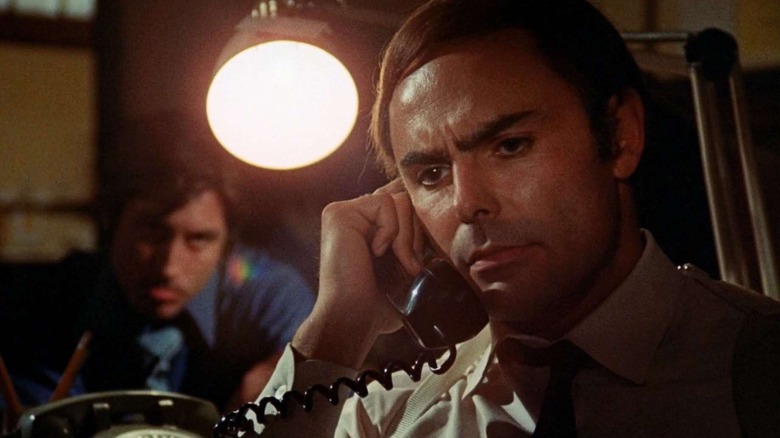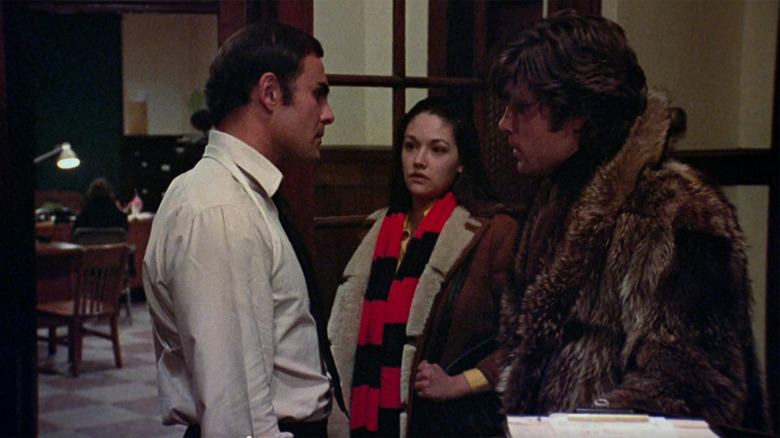A Heartbreaking Series Of Events Forced A Last-Minute Black Christmas Recast
50 years after its release, Bob Clark's "Black Christmas" remains one of the most chilling scary stories put to celluloid. The 1974 proto-slasher pits a group of sorority members against "Billy," an almost preternatural stranger who sputters incoherent yet disturbing sentiments at them over phone calls before hunting them down, all the while discreetly stowed away in their attic. Yet, the real horror of the film is as much the entitled men and patriarchy these young women have to deal with as the mysterious individual actively trying to murder them.
"Black Christmas" may have been released decades before "ACAB" came back into the vernacular (although, fun fact, the term originated in the early 20th century), but it embraces the same idea. The police are enragingly slow to respond to these women and their harassment complaints, with John Saxon's Lieutenant Fuller the rare competent officer who actually listens to them and soon realizes just how much immediate danger they're in. Saxon himself would go on to become a staple of the slasher genre, later playing Final Girl Nancy Thompson's old man in the "Nightmare on Elm Street" films.
As sympathetic as Saxon would prove to be as the level-headed but trustworthy Fuller, his casting in "Black Christmas" came to pass under some pretty heart-breaking circumstances. In their 2022 book, "It's me, Billy — Black Christmas Revisited," authors Paul Downey and David Hastings recount how the actor only came on board after Clark was forced to cut his original choice for the role, Edmond O'Brien. The revered character actor had landed an Oscar for his supporting role in 1954's "The Barefoot Contessa" and starred in such classics as "The Man Who Shot Liberty Vance" and "Birdman of Alcatraz," but was in poor health at that point due to complications from Alzheimer's disease.
Saxon had a good experience all the same
It's not just the story in "Black Christmas" that's bone-cold. The film was shot under inhospitably freezing conditions in Canada, which Clark knew would have been dangerously stressful for someone like O'Brien (who had spent 45 minutes just trying to put his coat on when the director met him in a hotel right before production). Calling it "one of the saddest moments of my life," Clark said he "loved" the actor and had "worked hard to get him for the movie" but realized he would have to replace him.
Fortunately, as Saxon recalled, his last-minute involvement in the movie was an otherwise smooth process. It helped that he was already familiar with the "Black Christmas" script by Roy Moore and had even been mistakenly set to play Fuller before his agent sheepishly informed him that, as it turned out, someone else had previously been hired (namely, O'Brien). "I was disappointed, but oh well," Saxon admitted. His disappointment didn't last long, though; a week later, his agent called again and suddenly Saxon was on his way to Toronto, where he was "taken to a hotel and then was driven out to a suburban location to prepare to do the scene in the woods speaking over a Bullhorn, which was finished at about 3 AM."
You wouldn't know any of this trouble had gone down from the final film, which tells its bleak and disconcerting tale of Christmastime terror in an assured and confident manner. Do yourself a favor and fire this one up at home on a dark, wintery evening sometime. Just maybe make sure all the doors and windows to your place are locked, lest some nosy intruder get it in their head to try and sneak inside when you're not looking ...

